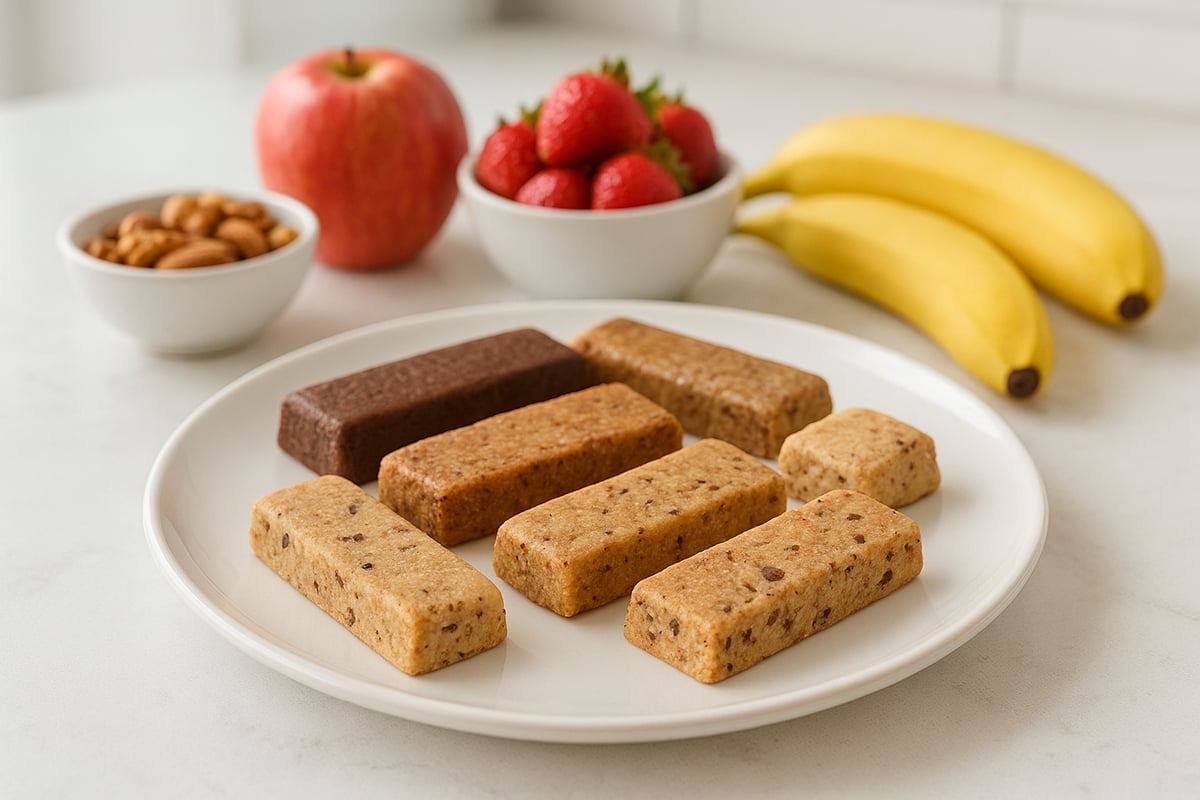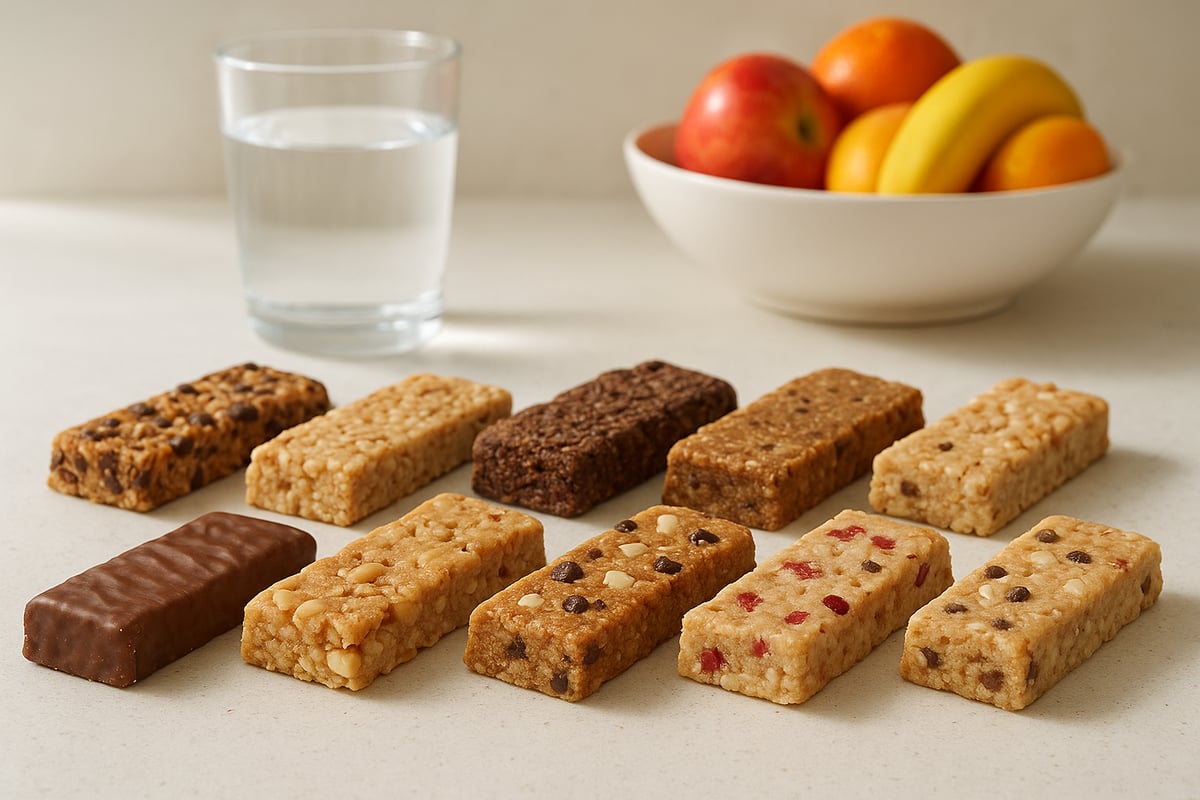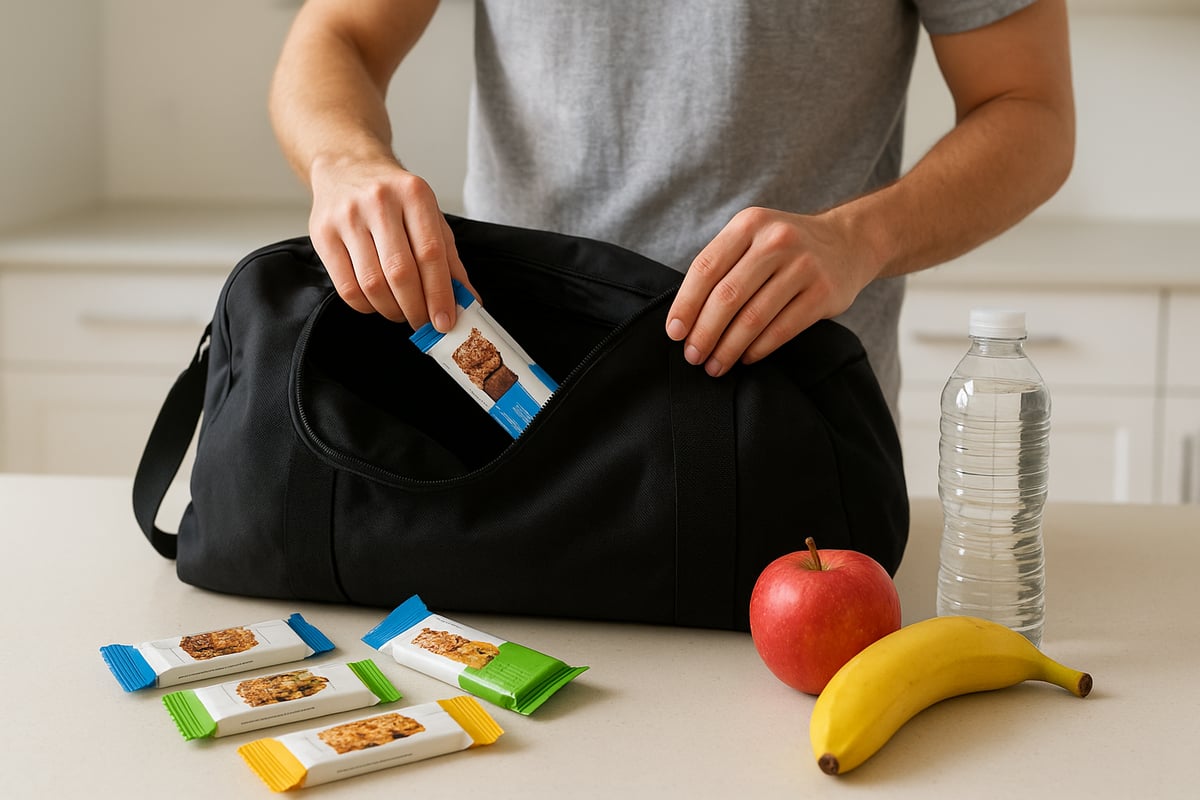Looking for the best low calorie protein bars to support your health goals in 2025? You are not alone. More people than ever are turning to protein bars for smart snacking, weight management, and convenient nutrition.
This article reviews and compares the top 8 low calorie protein bars, ensuring you do not have to compromise on taste or nutrition. We will break down key features, pricing, unique benefits, and match each bar to different lifestyles.
Ready to find your perfect protein snack? Explore our curated list and make an informed, confident choice for your wellness journey.
Why Choose Low Calorie Protein Bars?
Choosing low calorie protein bars can be a game changer for anyone looking to improve health, lose weight, or simply snack smarter. These bars are designed to deliver high-quality nutrition in a convenient, portable form, making them ideal for busy schedules and active lifestyles. With modern formulations, you no longer have to compromise on taste or ingredient quality to meet your dietary goals.

Nutritional Advantages for Weight Management
Low calorie protein bars offer significant advantages for weight management. Protein is essential for maintaining muscle mass during calorie deficits, and it also helps you feel full for longer periods. Many of these bars contain between 150 and 200 calories with 10 to 20 grams of protein, making them a smart choice for controlling portion sizes and daily caloric intake.
Convenience is another major benefit. Whether you are rushing to work or heading to the gym, these bars are easy to grab and consume on the go. Balanced macros, including fiber and healthy fats, help provide sustained energy throughout the day. For those interested in building better snacking habits, check out tips for healthy snacking habits to complement your selection of low calorie protein bars.
Ideal Use Cases and Target Audiences
Low calorie protein bars are versatile and cater to a range of needs. Fitness enthusiasts often use them for post-workout recovery, as they provide protein without adding unnecessary sugars or calories. They are equally popular among individuals on weight loss journeys who need satisfying snacks that support their goals.
Other ideal users include busy parents, professionals, and students who want a healthy snack between meals. If you have dietary restrictions, such as gluten-free or plant-based preferences, you will find options that cater to your needs. For more guidance on matching snacks to your lifestyle, explore how to find the right bar for your goals.
Common Pitfalls and How to Avoid Them
While low calorie protein bars are convenient, not all are created equal. Some contain hidden sugars or artificial ingredients that can undermine your health efforts. Always check the nutrition label for protein sources, such as whey, soy, or plant-based blends, and look for bars that use natural sweeteners.
Be mindful of potential allergens and additives, especially if you have sensitivities. Integrate these bars into a balanced diet rather than relying on them as meal replacements. For a deeper dive into what to watch out for, read about avoiding common weight loss mistakes and discover how smarter choices can support long-term results.
Trends in 2025: What’s New?
The landscape for low calorie protein bars is evolving rapidly in 2025. There is a noticeable shift toward plant-based and allergen-friendly formulations, driven by consumer demand for cleaner, more sustainable options. Brands are also innovating with unique flavors and functional add-ins like probiotics and adaptogens.
Sourcing transparency and certifications such as USDA Organic or Non-GMO are becoming standard. For a closer look at how vegan and organic options are shaping the market, explore the latest protein bars trends for 2025. If you are interested in mindful snacking and holistic wellness, you can also learn more about mindful snacking and see how habit change supports healthy eating.
How We Selected the Best Low Calorie Protein Bars
Choosing the best low calorie protein bars requires a careful, evidence-based approach. We wanted to ensure our recommendations would fit a wide range of dietary preferences, lifestyles, and nutritional goals. Our process combined expert insights, real-world feedback, and a close look at key product features to bring you an unbiased, trustworthy list.

Research and Testing Methodology
Our methodology for evaluating low calorie protein bars started with strict criteria to ensure you get quality with every bite. Each bar had to meet these benchmarks:
- Calorie count under 200 per serving
- At least 10g of protein per bar
- Ingredient transparency and quality
- Appealing taste and texture
- Affordable price per serving
We included both plant-based and whey protein bars to reflect the diverse preferences of our readers. To make our list, we sourced data from verified customer reviews, expert nutrition panels, and reputable nutritional databases. We also considered how easily these bars could be purchased, whether online or at local retailers.
For those seeking practical weight management tools, see our step-by-step snacking strategies for more healthy eating insights.
Key Features We Evaluated
We assessed each of the low calorie protein bars based on features that matter most to consumers:
- Protein-to-calorie ratio for satiety and energy
- Sugar content, including natural vs. artificial sweeteners
- Flavor variety and palatability
- Texture and how easy the bar is to eat on the go
- Packaging convenience for busy schedules
- Brand transparency, certifications like USDA Organic or Non-GMO
As trends shift toward clean labels and functional ingredients, we prioritized bars that align with these evolving standards. For a deeper look at industry shifts, see 2025 Trends in Single-Serve Protein Bars and Cookies.
Interested in how protein bars fit into a broader wellness routine? Explore healthy habit formation for actionable ideas.
User Feedback and Real-World Performance
User experiences are vital in our selection process for low calorie protein bars. We highlighted products with consistently high ratings (4.5+ stars) and positive testimonials related to taste, digestibility, and energy support.
Common likes included satisfying flavors, soft or chewy textures, and a noticeable boost in satiety. On the flip side, some users noted chalky textures, strong aftertastes, or higher prices as drawbacks.
We encourage readers to explore more snack options and to find the right bar for your needs.
If you want to avoid hidden sugars and additives, check out our label-reading guide. For practical tips on integrating snacks into your lifestyle, see smart snack planning. For support with emotional eating, visit mindful snacking resources.
Top 8 Low Calorie Protein Bars to Try in 2025
Looking for the best low calorie protein bars to fuel your goals in 2025? The right bar can help you manage your weight, support muscle recovery, and keep your snacking on track. With so many options on the market, making an informed choice is essential for your health and fitness journey.
In this guide, we review and compare the top 8 low calorie protein bars, highlighting their unique features, pricing, and who each bar is best suited for. Whether you need a quick post-workout boost, a midday snack, or a convenient meal support, our expert picks will help you find the perfect fit for your lifestyle.

ALOHA Peanut Butter Cup Protein Bar
The ALOHA Peanut Butter Cup Protein Bar is a favorite for those seeking clean, plant-based nutrition. Each bar contains 14g of plant protein and 220 calories, making it a robust option for anyone looking for low calorie protein bars that deliver both taste and nutrition.
- Price: $34.99 for a 12-count box, with subscribe & save discounts.
- Key Features:
- 14g protein
- 220 calories
- USDA Organic
- Gluten, soy, and dairy-free
- Benefits: ALOHA bars use real, non-GMO ingredients and contain no artificial sweeteners. The peanut butter cup flavor offers an indulgent taste while keeping ingredients simple.
- Ideal For: Vegans, allergy-conscious snackers, and those prioritizing organic foods.
Pros:
- Certified organic and non-GMO
- Suitable for multiple dietary restrictions
- No artificial additives
Cons:
- Slightly higher in calories compared to some other low calorie protein bars
If you’re new to plant-based snacking, find your perfect protein bar with our expert guidance.
RXBAR Chocolate Sea Salt
RXBAR Chocolate Sea Salt stands out for its minimalist approach. Each bar contains 12g of protein and 200 calories, crafted from egg whites, dates, and nuts. This makes it a strong contender among low calorie protein bars for those who value whole-food ingredients.
- Price: Approximately $25.99 for a 12-pack.
- Key Features:
- 12g protein
- 200 calories
- No added sugar
- Gluten-free
- Benefits: The chewy texture and transparent ingredient list appeal to clean label seekers. No artificial flavors or preservatives are used.
- Ideal For: Gluten-free diets, clean eaters, and busy professionals.
Pros:
- Simple, recognizable ingredients
- No artificial flavors or preservatives
Cons:
- Contains nuts and eggs, not suitable for all allergies
- Texture may not appeal to everyone
For more on building healthy snack habits, see expert snacking tips.
ONE Bar Maple Glazed Doughnut
For those with a sweet tooth, the ONE Bar Maple Glazed Doughnut flavor offers a dessert-inspired experience with just 220 calories and 20g of protein. This bar is a high-protein option among low calorie protein bars, perfect for post-workout recovery or a satisfying snack.
- Price: Around $24.99 per 12-pack.
- Key Features:
- 20g protein
- 1g sugar
- 220 calories
- Benefits: The flavor mimics a classic doughnut while maintaining a low sugar count and high protein-to-calorie ratio.
- Ideal For: Fitness-focused individuals and those managing sugar intake.
Pros:
- Low sugar content
- High protein per serving
- Wide variety of flavors
Cons:
- Contains dairy and sugar alcohols, which may not suit all diets
Explore more healthy snack swaps and discover mindful snacking strategies for your weight management plan.
Quest Nutrition Chocolate Chip Cookie Dough
A staple in the world of low calorie protein bars, Quest Nutrition’s Chocolate Chip Cookie Dough bar provides 21g of protein, 190 calories, and only 4g net carbs. Its high fiber content and keto-friendly profile make it popular with athletes and low-carb dieters.
- Price: About $29.99 for a 12-pack.
- Key Features:
- 21g protein
- 4g net carbs
- 190 calories
- Benefits: This bar supports muscle recovery and keeps net carbs low for those following keto or low-carb diets.
- Ideal For: Athletes, keto dieters, and anyone seeking a filling snack.
Pros:
- High protein and fiber
- Low sugar
- Keto-friendly
Cons:
- Contains dairy and processed fibers
- Some may find the texture a bit chewy
If you’re looking for more advice on managing your macros, explore healthy eating tips.
Built Bar Coconut Almond
Built Bar Coconut Almond is a standout in the category of low calorie protein bars, offering 17g of protein and just 130 calories per bar. The real chocolate coating and soft texture make this bar feel more like a treat than a health food.
- Price: About $29.95 for a 12-pack.
- Key Features:
- 17g protein
- 130 calories
- Real chocolate coating
- Benefits: Low calorie, gluten-free, and available in a variety of dessert-inspired flavors.
- Ideal For: Calorie-conscious snackers and chocolate lovers.
Pros:
- Dessert-like taste and texture
- Lower in calories than most competitors
Cons:
- Contains sugar alcohols
- May melt in warm conditions
Want to learn how to fit treats into a balanced diet? See how habit change supports healthy eating for sustainable results.
No Cow Lemon Meringue Pie
No Cow Lemon Meringue Pie offers a vegan-friendly option with 21g of plant-based protein and only 190 calories. These low calorie protein bars are free from dairy, soy, and gluten, making them accessible for those with multiple dietary restrictions.
- Price: Roughly $29.99 for a 12-pack.
- Key Features:
- 21g plant protein
- 190 calories
- Dairy, soy, and gluten-free
- Benefits: High protein and fiber content, suitable for vegans and those avoiding common allergens.
- Ideal For: Vegans, lactose-intolerant individuals, and those seeking allergy-friendly snacks.
Pros:
- High protein, plant-based
- Allergy-friendly and vegan certified
Cons:
- Dense texture may not appeal to all
- Unique flavor profile
For more on plant-based nutrition, find healthy alternatives for your snack routine.
Orgain Organic Protein Bar Peanut Butter Chocolate Chunk
Orgain’s Organic Protein Bar in Peanut Butter Chocolate Chunk delivers 10g of plant protein with only 150 calories. These low calorie protein bars are USDA Organic and non-GMO, perfect for clean eating advocates.
- Price: Around $23.99 per 12-pack.
- Key Features:
- 10g protein
- 150 calories
- USDA Organic
- Benefits: Focuses on organic, simple ingredients with no artificial preservatives or colors.
- Ideal For: Those seeking organic, lower-calorie snacks.
Pros:
- Lower calorie content
- Organic, clean ingredient list
Cons:
- Lower protein compared to others in this list
Curious about how organic snacks can fit your goals? Explore science-backed weight loss strategies.
Clif Builders Protein Bar Chocolate Mint
Clif Builders Protein Bar in Chocolate Mint is designed for those who need a substantial post-workout snack. With 20g of protein and 280 calories, it is higher in calories but offers a satisfying, bold flavor.
- Price: About $19.99 for a 12-pack.
- Key Features:
- 20g protein
- 280 calories
- Non-GMO
- Benefits: High protein content and robust flavors make it ideal for athletes.
- Ideal For: Active individuals needing more substantial nutrition after exercise.
Pros:
- High protein per bar
- Widely available
Cons:
- Higher calorie count than most low calorie protein bars
- Contains soy
Want more tips on fueling your workouts? Get personalized snack recommendations for your routine.
Market Trends and Choosing the Right Bar
The market for low calorie protein bars continues to grow as more consumers seek healthy, convenient snacks. According to the Protein Bar Market Size & Industry Report, 2025-2035, demand for high-protein, low-calorie, and clean-label bars is projected to rise rapidly in the coming decade.
When choosing the best bar for your needs, consider your dietary restrictions, taste preferences, and nutritional goals. Always read labels carefully to avoid hidden sugars and allergens.
For more practical advice on healthy snacking, read our guide to mindful eating.
Final Tips for Low Calorie Protein Bar Success
- Rotate between different bars to avoid flavor fatigue and ensure a range of nutrients.
- Pair bars with fruits or vegetables for a more balanced snack.
- Store bars in a cool, dry place to maintain taste and texture.
If you need more ideas for healthy habits, explore the science of weight loss without restriction, or learn about sustainable nutrition habits.
With so many options, choosing the right low calorie protein bars in 2025 has never been easier. Use this guide to find your perfect match and stay on track with your health and fitness goals.
How to Incorporate Protein Bars Into a Healthy Lifestyle
Incorporating low calorie protein bars into your daily routine can be a practical way to support your health goals. These bars offer balanced nutrition, portability, and convenience, making them a smart choice for busy lifestyles. However, how you use low calorie protein bars matters just as much as which bar you choose. Let's explore effective strategies for integrating these snacks into a well-rounded approach to healthy living.

Smart Snacking Strategies
Using low calorie protein bars as part of a balanced meal plan helps you avoid common snacking pitfalls. Rather than relying on bars as meal replacements, pair them with whole foods like apple slices, carrot sticks, or a handful of berries for a more satisfying snack.
Scheduling snacks throughout the day can help manage cravings and prevent mindless eating. For example, enjoying a bar after a workout can support muscle recovery and provide sustained energy. Integrating low calorie protein bars with exercise routines is a practical way to meet your protein goals without exceeding your calorie budget.
Consider creating a snack station at home or work with a variety of healthy choices, including your favorite low calorie protein bars. For additional guidance on mindful snacking, visit this helpful resource.
Reading Labels and Making Informed Choices
Selecting the best low calorie protein bars starts with reading ingredient labels carefully. Look for bars with simple, recognizable ingredients and minimal additives. If you are sensitive to sugar alcohols or artificial sweeteners, choose bars that avoid these substances.
It is important to select low calorie protein bars that fit your dietary needs, whether you are vegan, gluten-free, or have nut allergies. Evaluating protein sources, such as whey or plant-based proteins, ensures you get the right nutritional profile for your lifestyle.
Pay close attention to serving size, fiber content, and sugar levels. For more on how to avoid hidden sugars and additives, check out these practical tips. You can also explore science-backed weight loss strategies that work for a comprehensive approach.
Holistic Approaches to Weight Management
Low calorie protein bars are most effective when used as part of a holistic strategy for weight management. Combine healthy snacking with mindful eating practices, such as eating slowly and recognizing true hunger cues. Address emotional eating by identifying stress triggers and developing non-food coping mechanisms.
For those interested in sustainable results, neuroscience-based solutions can help retrain your brain for healthier habits. Learn more about retraining your brain for healthy habits and how it can complement your use of low calorie protein bars.
If you are curious about how metabolism impacts your nutrition choices, explore the science of boosting metabolism to maximize your results. For more resources, see habit change strategies and healthy eating guidance.
Additional Resources
If you want to build lasting healthy habits, consider reading this in-depth article. For more healthy snack ideas, visit these expert tips. Consulting with a registered dietitian can also provide personalized advice to help you make the most of low calorie protein bars in your wellness journey.
Now that you know which low calorie protein bars stand out in 2025, it’s time to find the one that truly fits your lifestyle and goals. We’ve covered options for every preference—plant based, high protein, allergen friendly, and more—so you can make snacking both healthy and enjoyable. If you’re ready to take the next step toward effortless, mindful eating and want a little extra guidance, I invite you to Start Quizz. This quick quiz will help match you with the best protein bar for your needs and support your journey to healthier habits.















